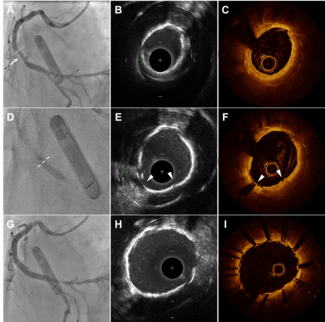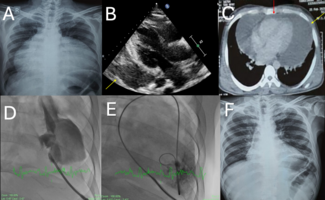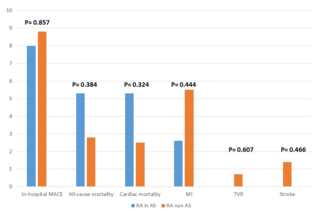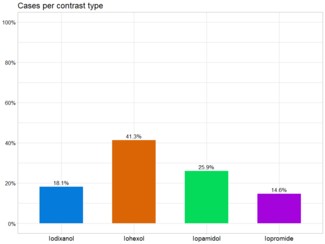Myocardial Infarction With Acute Valvular Regurgitation
ABSTRACT: Left-sided valvular lesions are commonly associated with acute and chronic coronary syndromes. Ischemic mitral regurgitation is well described in the literature. We report a case of acute ischemic right-sided valvular disease in which the presenting symptom of an infarction was severe tricuspid regurgitation. This rare entity is usually caused by distortion of the valve apparatus due to underlying wall motion abnormalities. In conclusion, tricuspid regurgitation is an important yet uncommon presentation of acute ischemia that requires a high degree of suspicion for diagnosis.
J INVASIVE CARDIOL 2012;24(8):E170-E171
____________________________________________________
 Case Report. A 46-year-old male patient with hyperlipidemia and a significant family history of early coronary disease was running on his treadmill at home when he experienced sudden-onset diaphoresis. Upon rest, he felt mild nausea and dizziness. These symptoms persisted for nearly an hour, and resolved spontaneously. He runs a mile daily on the treadmill, and never experienced these symptoms prior to this episode. The next morning, he reported feeling well, and went to work as usual. By midday, he noticed excessive fatigue and
Case Report. A 46-year-old male patient with hyperlipidemia and a significant family history of early coronary disease was running on his treadmill at home when he experienced sudden-onset diaphoresis. Upon rest, he felt mild nausea and dizziness. These symptoms persisted for nearly an hour, and resolved spontaneously. He runs a mile daily on the treadmill, and never experienced these symptoms prior to this episode. The next morning, he reported feeling well, and went to work as usual. By midday, he noticed excessive fatigue and  mild shortness of breath. Later that evening, he visited the office of a relative who was a community cardiologist. An EKG demonstrated diminutive R waves in III and aVF, and T-wave inversions in the same leads. There were no ST-T wave segment changes (Figure 1). A transthoracic echocardiogram in the office demonstrated severe tricuspid regurgitation (Figure 2). The patient was directly admitted to the hospital for further cardiac evaluation.
mild shortness of breath. Later that evening, he visited the office of a relative who was a community cardiologist. An EKG demonstrated diminutive R waves in III and aVF, and T-wave inversions in the same leads. There were no ST-T wave segment changes (Figure 1). A transthoracic echocardiogram in the office demonstrated severe tricuspid regurgitation (Figure 2). The patient was directly admitted to the hospital for further cardiac evaluation.
 On arrival to the emergency room, vitals were normal; blood pressure was 132/84 and pulse was 63 bpm. A III/VI systolic murmur was noted in the left sternal border. Lungs were clear to auscultation, and the remainder of the exam was normal. The patient underwent a transesophageal echocardiogram (TEE) to evaluate the severity and mechanism of the regurgitant lesion. The TEE revealed moderate right ventricle (RV) dilatation and a distinct akinetic anterior wall of the RV. The severe tricuspid regurgitation was due to tethering of the leaflets, secondary to the underlying wall motion abnormality (Figure 3). The wall motion in other regions was preserved and there were no other accompanying valvular abnormalities.
On arrival to the emergency room, vitals were normal; blood pressure was 132/84 and pulse was 63 bpm. A III/VI systolic murmur was noted in the left sternal border. Lungs were clear to auscultation, and the remainder of the exam was normal. The patient underwent a transesophageal echocardiogram (TEE) to evaluate the severity and mechanism of the regurgitant lesion. The TEE revealed moderate right ventricle (RV) dilatation and a distinct akinetic anterior wall of the RV. The severe tricuspid regurgitation was due to tethering of the leaflets, secondary to the underlying wall motion abnormality (Figure 3). The wall motion in other regions was preserved and there were no other accompanying valvular abnormalities.
 Based on the TEE findings, the patient was referred for cardiac catheterization. The patient was found to have 100% occlusion of the proximal right coronary artery (Figure 4), and subsequently underwent successful restoration of flow with a drug-eluting stent. Follow-up echocardiography 6 months later showed the severity of tricuspid regurgitation had decreased (moderate); however, the RV remained moderately hypokinetic and mildly dilated.
Based on the TEE findings, the patient was referred for cardiac catheterization. The patient was found to have 100% occlusion of the proximal right coronary artery (Figure 4), and subsequently underwent successful restoration of flow with a drug-eluting stent. Follow-up echocardiography 6 months later showed the severity of tricuspid regurgitation had decreased (moderate); however, the RV remained moderately hypokinetic and mildly dilated.
We describe a case of acute ischemic tricuspid regurgitation prompting emergent catheterization and revascularization. This rare entity is easily overlooked; therefore it is important to recognize these subtle findings. Tricuspid regurgitation associated with a myocardial infarction is almost always caused by distortion of the valve apparatus. Another possible mechanism involves papillary muscle dysfunction due to underlying myocardial wall motion abnormality.
Ischemic mitral regurgitation is well described and commonplace, but there is a paucity of information regarding right sided ischemic valve dysfunction. To our knowledge, there has only been one case report in the literature describing tricuspid regurgitation in the setting of ischemia.1 Our case is distinguished in the fact that our patient’s only clue to an acute infarct was severe tricuspid regurgitation and vague symptoms. This is a rare clinical entity that requires a strong degree of suspicion and prompt intervention to prevent further negative remodeling.
Reference
- Dandekar U, Sachithanandan A, Kalkat M, Ridley P, Satur CM. Isolated severe ischemic tricuspid regurgitation successful surgical repair. J Heart Valve Dis. 2007;16(3):331-332.
____________________________________________________
From the Montefiore Medical Center/Albert Einstein College of Medicine, Bronx, New York.
Disclosure: The authors have completed and returned the ICMJE Form for Disclosure of Potential Conflicts of Interest. The authors report no conflicts of interest regarding the content herein.
Manuscript submitted February 27, 2012, provisional acceptance given March 15, 2012, final version accepted April 2, 2012.
Address for correspondence: Dr. Sandhya Murthy, MD, Montefiore Medical Center/Albert Einstein College of Medicine, Cardiology, 111 E 210th Street, Bronx, NY 10467. Email: sandhya.murthymd@gmail.com


















